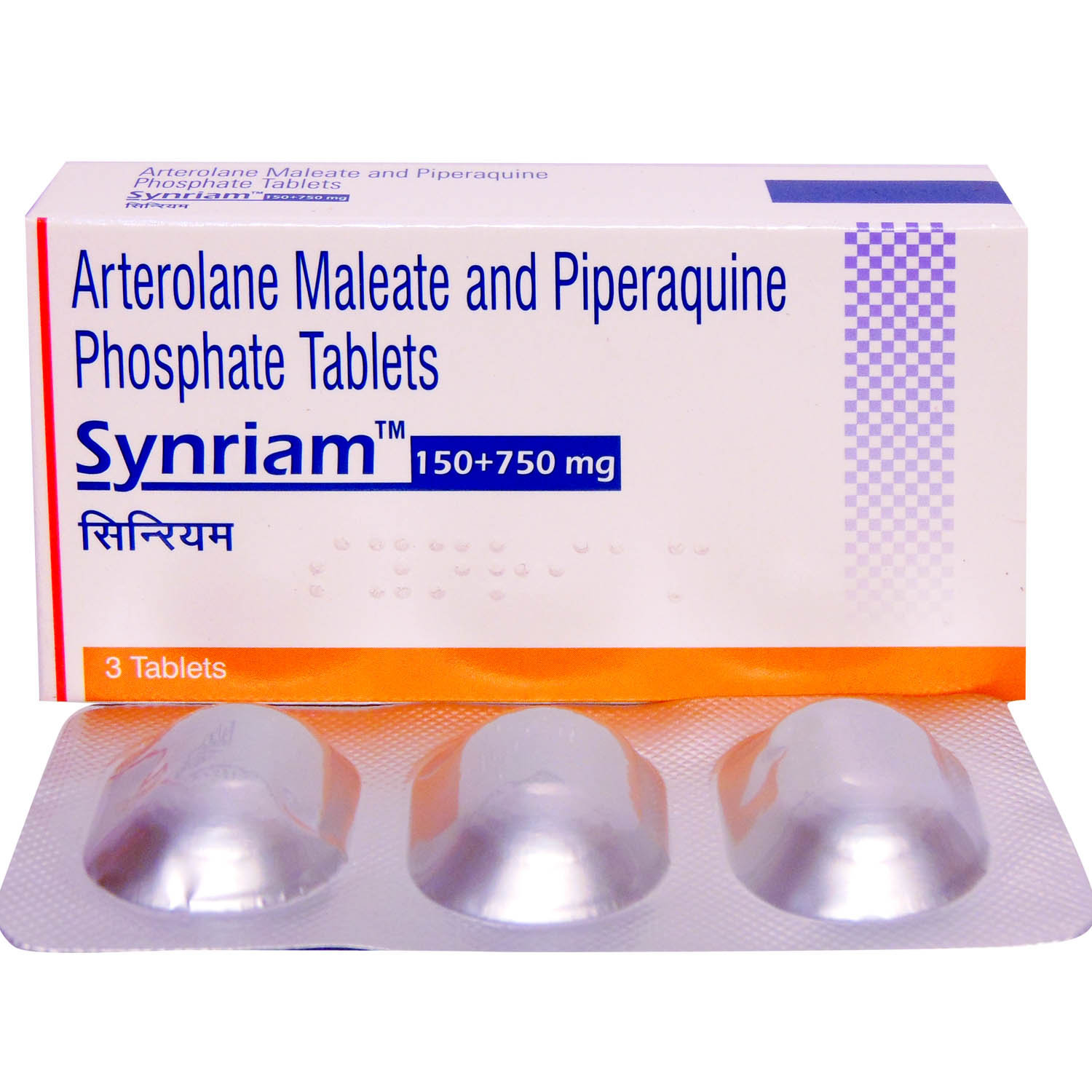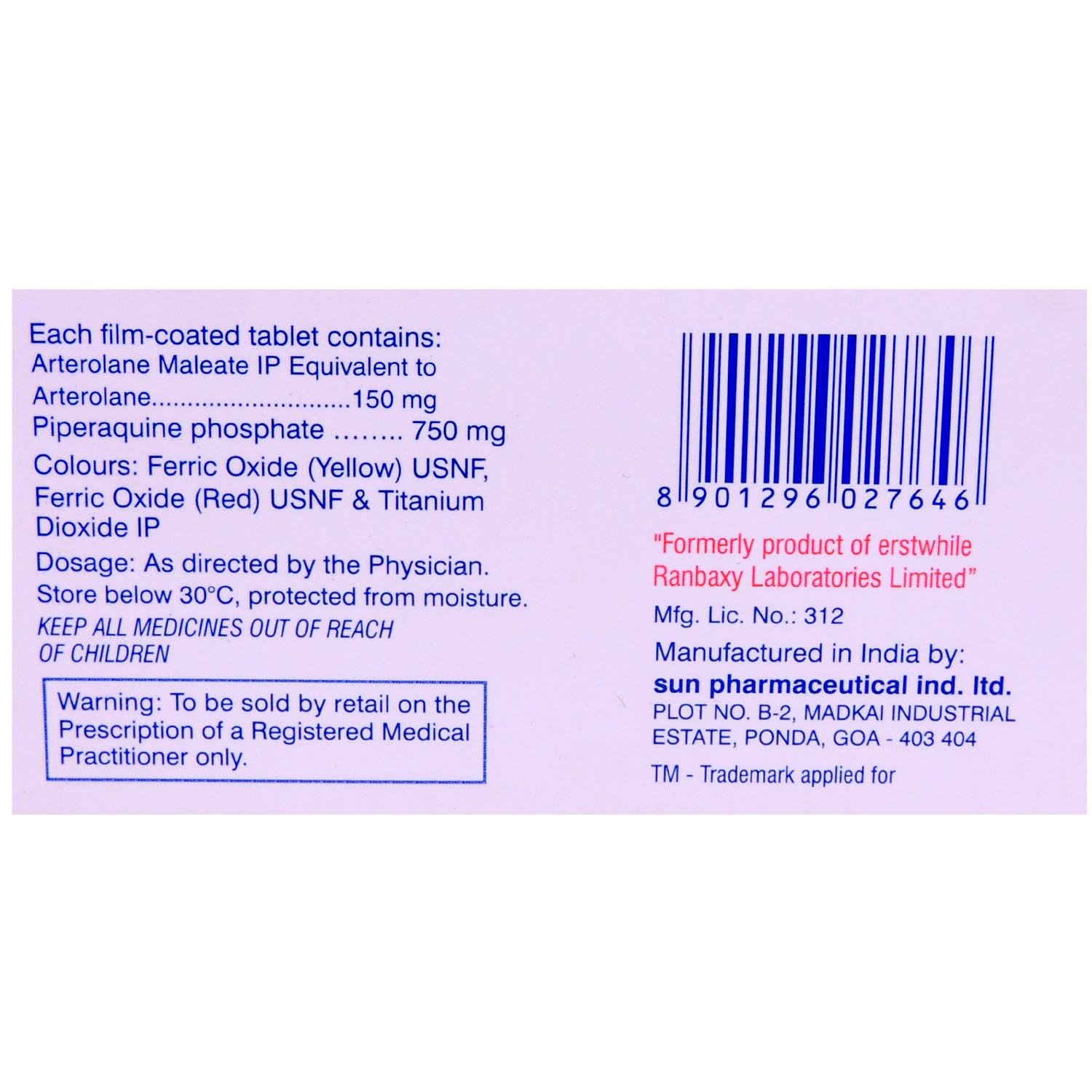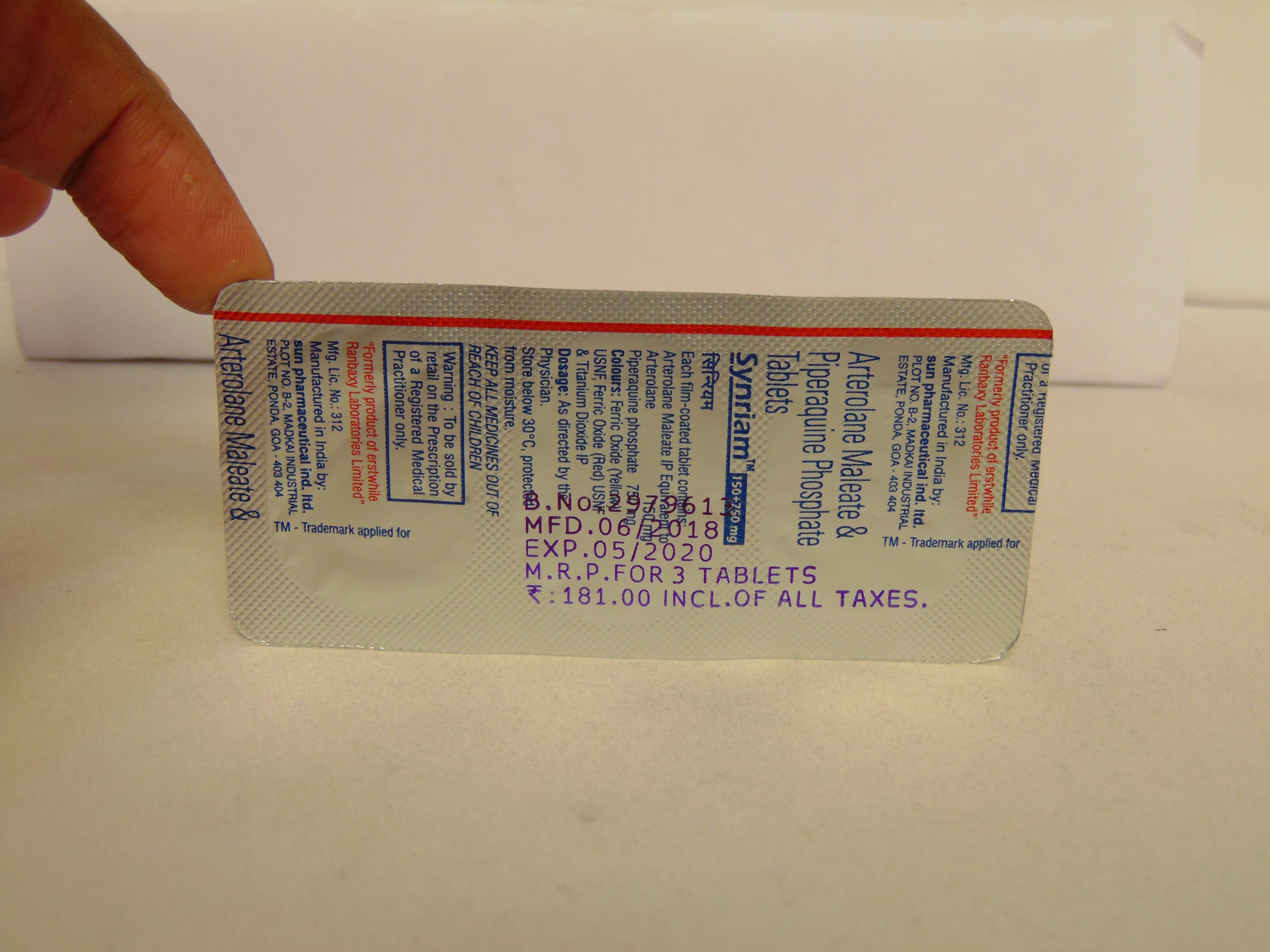Synriam Tablet 3's
MRP ₹263
(Inclusive of all Taxes)
₹39.5 Cashback (15%)
Provide Delivery Location
Online payment accepted
 Prescription drug
Prescription drugWhats That
Composition :
Manufacturer/Marketer :
Consume Type :
Expires on or after :
Return Policy :
About Synriam Tablet
Synriam Tablet belongs to the class of medications called 'anti-malarial primarily used to treat malaria. Synriam Tablet gives a degree of protection (prophylaxis) against malaria when people travel to areas where malarial cases exist. It is effective against Plasmodium vivax, Plasmodium ovale, and Plasmodium malariae. Synriam Tablet is not effective against Plasmodium falciparum. Besides this, it also treats amoebiasis (intestinal dysentery) and rheumatic disease (arthritis).
Synriam Tablet contains 'arterolane maleate' and 'piperaquine phosphate'. Synriam Tablet together treats malaria. They work by increasing the levels of heme in the blood, a substance toxic to the malarial parasite. This kills the parasite and stops the infection from spreading.
The dose of Synriam Tablet can vary depending upon your condition and the severity of the infection. The common side effects of Synriam Tablet include nausea, vomiting, abdominal pain, loss of appetite, indigestion, cough, dizziness, headache. Everyone need not experience the above side effects. In case of any discomfort, speak with a doctor.
Before starting Synriam Tablet, please inform your doctor if you are allergic to Synriam Tablet. Do not take Synriam Tablet on your own. Synriam Tablet is used with caution during pregnancy and breastfeeding. Tell your doctor if you are taking medicines other than Synriam Tablet. Synriam Tablet used with caution in liver diseases, kidney diseases. Synriam Tablet should be used with extreme caution in patients suffering from cardiovascular diseases due to the increased risk of severe adverse effects including an irregular heart rhythm. The use of this Synriam Tablet may cause persistent vomiting in some patients.
Uses of Synriam Tablet
Directions for Use
Key Benefits
Synriam Tablet contains 'arterolane maleate' and 'piperaquine phosphate' belongs to the class of medications called 'anti-malarial primarily used to treat malaria. Synriam Tablet together treats malaria. They work by increasing the levels of heme in the blood, a substance toxic to the malarial parasite. This kills the parasite and stops the infection from spreading.
Storage
Drug Warnings
Before starting Synriam Tablet, please inform your doctor if you are allergic to Synriam Tablet. Do not take Synriam Tablet on your own. Synriam Tablet is used with caution during pregnancy and breastfeeding. Tell your doctor if you are taking medicines other than Synriam Tablet. Synriam Tablet used with caution in liver diseases, kidney diseases. Synriam Tablet should be used with extreme caution in patients suffering from cardiovascular diseases due to the increased risk of severe adverse effects including an irregular heart rhythm. The use of this Synriam Tablet may cause persistent vomiting in some patients. Appropriate dose adjustments or replacement with a suitable alternative may be necessary in these cases based on the clinical condition.
Diet & Lifestyle Advise
- Always take Synriam Tablet with meals for reduced gastric irritation.
- Adequate nutrition is the key to improvement in malaria-induced weakness.
- It is important to allow the patient to eat regularly in small amounts to tolerate the food.
- Increase fluid and protein intake for malaria-induced weight loss.
- Proper rest and mosquito-free premises are important for the patient to recover.
Side Effects of Synriam Tablet
- Nausea
- Vomiting
- Abdominal pain
- Loss of appetite
- Indigestion
- Cough
- Dizziness
- Headache
Habit Forming
Therapeutic Class
All Substitutes & Brand Comparisons
FAQs
Synriam Tablet contains 'arterolane maleate" and "piperaquine phosphate". Synriam Tablet together treats malaria. They work by increasing the levels of heme in the blood, a substance toxic to the malarial parasite. This kills the parasite and stops the infection from spreading.
Common side effects of Synriam Tablet include nausea, vomiting, abdominal pain, loss of appetite, indigestion, cough, dizziness, headache. Everyone need not experience the above side effects. In case of any discomfort, speak with a doctor.
Synriam Tablet should be used with caution in patients having an impaired kidney function. If the impairment is very severe then the use of this medicine should be avoided.
No, the use of Synriam Tablet is not recommended during pregnancy as it may harm your unborn baby. Seek proper advice from your doctor on using this medicine, if you are pregnant.
Synriam Tablet should be used with extreme caution in patients suffering from cardiovascular diseases due to the increased risk of severe adverse effects including an irregular heart rhythm. Close monitoring of heart function and vital signs, appropriate dose adjustments, or replacement with a suitable alternative may be necessary based on the clinical condition of the patient.
Drug-Drug Interactions Checker List
- ASPIRIN
- HYDROXYZINE
- TAMOXIFEN
- CIPROFLOXACIN
- AMOXICILLIN
- MYCOPHENOLATE MOFETIL
- PRIMAQUINE
- MEFLOQUINE
- HYDROXYCHLOROQUINE
- PREGABALIN
- LEVETIRACETAM
- ESOMEPRAZOLE
- ALPRAZOLAM
Special Advise
- Finish the prescribed course, even if you start to feel better. Stopping it early may make the infection come back and harder to treat.
- Avoid mosquito bites by using a mosquito net, insect repellent, and by covering your arms and legs
Disease/Condition Glossary
Malaria: It is a severe & fatal parasitic infection caused by a protozoan called Plasmodium. 4 types of parasites can infect humans with malaria: Plasmodium falciparum, Plasmodium vivax, Plasmodium ovale, and Plasmodium malaria. Female anopheles mosquito bites cause it. If bitten by an infected mosquito (the Anopheles mosquito), malaria parasites are injected into the blood. These parasites then migrate to the liver where they multiply via the bloodstream. A patient doesn't feel sick at this period because the parasites are in the liver. Then the parasites leave the liver and enter the red blood cells where the parasites are developing, and then the red blood cells burst, allowing them to transfer to another blood cell. The parasites release harmful chemicals into the bloodstream at this point, and the patient begins to feel ill. Malaria leads to periodic fever-chills, anaemia, kidney failure, and jaundice due to excessive red blood cell death due to plasmodium growth inside them.

Have a query?
Alcohol
Safe if prescribed
It is not known whether it is safe to consume alcohol with Synriam Tablet, Please consult your doctor before taking Synriam Tablet.
Pregnancy
Consult your doctor
Synriam Tablet may be unsafe to use during pregnancy. Although there are limited studies in humans, animal studies have shown harmful effects on the developing baby. Your doctor will weigh the benefits and any potential risks before prescribing it to you. Please consult your doctor before taking Synriam Tablet.
Breast Feeding
Consult your doctor
Synriam Tablet is not recommended for use in breastfeeding women unless absolutely necessary. All the risks and benefits should be discussed with the doctor before taking this medicine.
Driving
Safe if prescribed
It is not known whether Synriam Tablet alters the ability to drive. Do not drive if you experience any symptoms that affect your ability to concentrate and react.
Liver
Consult your doctor
Synriam Tablet should be used with caution in patients with liver disease. A dose adjustment of Synriam Tablet may be needed. Please consult your doctor before taking Synriam Tablet.
Kidney
Consult your doctor
Synriam Tablet should be used with caution in patients with kidney disease. A dose adjustment of Synriam Tablet may be needed. Please consult your doctor before taking Synriam Tablet.
Children
Safe if prescribed
safe to use in children (<12) yet dose adjustment by a doctor will be done on the basis of age, weight, and severity of the infection.









